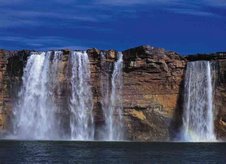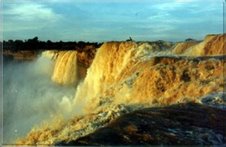


 (the rivers of Chhattisgarh are being sold by the followers of such Weed-Smoking "Sadhus" or "Gurus" who feel that all their sins are washed away once they take a dip in holey rivers.No wonder the Politicians and the Likes of Ambanis,Tatas,Jindals come up with policies to kill and displace farmers,dalits,tribals of India to achieve their monetory goals and later go to some holey temple or river to wash away their sins.)
(the rivers of Chhattisgarh are being sold by the followers of such Weed-Smoking "Sadhus" or "Gurus" who feel that all their sins are washed away once they take a dip in holey rivers.No wonder the Politicians and the Likes of Ambanis,Tatas,Jindals come up with policies to kill and displace farmers,dalits,tribals of India to achieve their monetory goals and later go to some holey temple or river to wash away their sins.) In March 2007, a Public Accounts Committee came down heavily on the Chhattisgarh government for allowing a private company to appropriate the waters of the Sheonath river. Never the less, business continues as usual. Infact, more corporate houses have been given easy access to river waters in the state at the cost of the drinking water and irrigation needs of local communities Gopinath Saura and Krishna Kumar didn't know how valuable water was until it was taken away from them. Like these two residents of Bonda Tikra village of Raigarh district in what was then Madhya Pradesh, all the villages in the district have had to contend with water scarcity ever since a factory put up by Jindal Steel started lifting water from the Kelo river a decade ago.Water levels in ponds have dropped and the villagers have little water even for drinking purposes.Tribals in these villages united and protested against the factory's usurpation of their rights to a basic necessity like water. The village had the first right over the river's water, they said, as they lobbied government departments from Raigarh to Bhopal for justice. When their demands fell on deaf ears, they started a hunger strike.
In March 2007, a Public Accounts Committee came down heavily on the Chhattisgarh government for allowing a private company to appropriate the waters of the Sheonath river. Never the less, business continues as usual. Infact, more corporate houses have been given easy access to river waters in the state at the cost of the drinking water and irrigation needs of local communities Gopinath Saura and Krishna Kumar didn't know how valuable water was until it was taken away from them. Like these two residents of Bonda Tikra village of Raigarh district in what was then Madhya Pradesh, all the villages in the district have had to contend with water scarcity ever since a factory put up by Jindal Steel started lifting water from the Kelo river a decade ago.Water levels in ponds have dropped and the villagers have little water even for drinking purposes.Tribals in these villages united and protested against the factory's usurpation of their rights to a basic necessity like water. The village had the first right over the river's water, they said, as they lobbied government departments from Raigarh to Bhopal for justice. When their demands fell on deaf ears, they started a hunger strike.One of those who sat on the hunger strike was Gopinath Saura's wife. "When my wife Satyabhama started a hunger strike, I expected that the government would understand the importance of the matter and would take back its decision to provide waterfrom the Kelo river to Jindal. But that didn't happen," says Saura.Satyabhama's voice was not heard and her health deteriorated after she refused to eat for seven days.
On January 26, 1998, when the whole country was celebrating the 48th Republic Day, Satyabhama died of hunger and lost the battle for water.Says Satyabhama's son Krishna Kumar: "A court case should have been filed against Jindal and the government officers in this matter, but on the contrary, the government jailed the people who were staging the movement alongside my mother against privatisation of the Kelo river.It is ten years since that tragic incident.
In those ten years hundreds of small and big factories have come up in Raigarh, enveloping the whole district in dust and black smoke; a separate state of Chhattisgarh was created with the ostensible aim of development of tribals. Many things changed, but the one thing that hasn't changed is the story of how rivers in Chhattisgarh have been exploited by private companies with the connivance of successive state governments.
The state of Chhattisgarh, formed on November 1, 2001, is not a water starved state. It had an average of some 126 ponds in every village. It receives approximately 1400 mm rain every year. Most of its 2.5 crore people, however, depend on the rivers for water and other needs. With five river basins – the Mahanadi, Godavari, Ganga, Narmada and Brahmani Kachar,and several rivers -- Mahanadi, Sheonath, Indravati, Jonk, Kelo, Arpa,Sabri, Hasdev, Eib, Kharun, Peri, and Maand -- water scarcity should not be a problem in the state.But it is, for ordinary people. The entire riverine economy is in tatters.People cannot use a single drop of water from the rivers for drinking purposes, or cast a single net to fish for their livelihood, and farmers who grew crops along the river banks are out of a livelihood.
Once the only reason for constructing dams on rivers was to irrigate farmland, now a days the aim is to provide water to industrial houses. In fact the government has actually imposed a ban on providing water for irrigation during the summer season. Faced by protests and resistance, successive governments have made promises to free the rivers from private hands, but their actions have been exactly the opposite, allowing more rivers to be privatised.
*How the rivers were sold**The Sheonath* and Mahanadi rivers contain 58.48% of the state's water resources. The Sheonath river originates in Durg and flows through Raipur,Bilaspur and Janjgir-Champa before merging with the Mahanadi. The Sheonath was the first river to be privatised in a shocking story of government abetment and corruption.
In 1981, MP Aydhyogik Kendra Vikas Nigam Ltd (MPAKVN), Raipur, was formed to assist industrial development centres. On June 26, 1996 M/s HEG Ltd of Durg Industrial Centre, Borai, wrote a letter to MPAKVN stating that they were being supplied 12 lakh litres of water, but after two months they would need 24 lakh litres extra water daily. MP Aydhyogik agreed to supply the extra water but said that since there was less water in the Sheonath river between February and June, it could not supply the same quantum of water during that period. However, it proposed that HEG Ltd should join with it to construct an annicut dam, since it didn't have the necessary resources for building the dam itself. After a series of meetings, whose proceedings are unknown, a new tender notice was issued for the dam on the Build, Own, Operate andc Transfer (BOOT) basis.
This tender made a provision for inclusion of 'tilting gates'. The bizarre fact is that before the tender was released, on October 14, 1997, Kailash Engineering Corporation of Rajnandgaon had written to MP Aydhyogik that they had developed automatic tilting gates and they therefore held the patent.
Clearly, the provision of tilting gates in the tender meant that the water project could only be executed by Kailash Engineering or by some other company with Kailash's consent.Soon after, MPAKVN handed over its entire infrastructure in Borai, and assets worth Rs 5 crore, to Kailash Soni, owner of Kailash Engineering, fora token Re 1, for establishing the water supply project on BOOT basis.Radius Water Limited, the company set up by Kailash Engineering to execute this project, was granted the contract on October 5, 1998; it was to be effective from October 4, 2000 to October 4, 2020.The company didn't conform to any of the standards relating to minimum capital and experience mentioned in the tender.
MPAKVN didn't take the permission of, or even inform, the irrigation, revenue, or any other department of the government before entering into the contract with Radius.Every clause and part of the tender and contract shows rank favouritism towards Radius. Constructing on BOOT basis means that the company will be responsible for both construction and maintenance through its own resources.
But MPAKVN had handed over all its resources to Kailash and on top of that had signed another contract which stated that Radius would receive Rs 650 crore in the form of a loan and Rs 250 crore through equity shares,amounting to a total of Rs 900 crore which will be expended on this project.
Every month, 3.6 mld water was being supplied by MPAKVN from the industrial area of Borai to various factories. The day the water supply project was handed over to Radius Water Ltd, the latter guaranteed MPAKVN that it would supply 4 mld water immediately. If MPAKVN had the capacity to supply 4 mldwater, what was the need for a new project?
Further, another contract for a period of 22 years was made between Radius and MPAKVN that even if the latter didn't take 4 mld water, it had to compulsorily pay for it. The truth was that MPAKVN only needed 2.4 mld water.The payment rates that were fixed were also shocking. While MPAKVN paid Re1 per cubic metre for the Murethi project of the irrigation department which is on the river Sheonath in Raipur district, it contracted to pay a whopping Rs 12.60 per cubic metre to Radius Water!
The responsibility of building the annicut dam on the Sheonath and supplying water lay with Radius Water Ltd. By the time the whole process was completed, the state of Chhattisgarh had come into being and MPAKVN became the Chhattisgarh State Industrial Development Corporation (CSIDC).
Radius also started fencing in 22.7 kilometres of the Sheonath after 2000 and had taken possession of thousands of square feet of land apart from the 176 acres adjoining the river bank.In the first year after taking over the resources of MPAKVN or CSIDC for apaltry Re 1, Radius collected Rs 15.12 lakh every month from the latter for the 4 mld of water it supplied under the contract.
This means that without investing a single rupee as capital, Radius received payments worth Rs 1,81,44,000 from the state government in the first year. Moreover, there were only two industries in Borai and they could not possibly have neededmore than 2.4 mld where as CSIDC was compelled to pay for 4 mld. Also, CSIDCreceived Rs 12 per 1,000 litres from the industries to which it was supplying water, but it had contracted to pay Radius Rs 15.02 per 1,000litres, thereby making a loss of Rs 3.02 per 1,000 litres.
The Sheonath river is the main source of water for most of the surrounding villages and was freely available to everyone. But after Radius Water Ltd took possession of the river, the villages situated on its banks have been prohibited from using its waters for irrigation, bathing, or anything else.
Hundreds of fishermen, whose fore fathers had fished here, have been forced to move out. Domestic animals can't get water. Land on the banks of the river which was used for cultivation, has been submerged following the hoarding of water for the annicut. A board has come up stating 'Bathing and fishing in this river are strictly prohibited. It may cause danger to yourlife'.
Thousands of farmers in the surrounding villages were shocked to learn that a river whose waters they used freely had been sold to a private company."What kind of Panchayati Raj is this where rivers are sold without the consent of villagers?" questions an indignant Bathvaram Tandon, sarpanch ofMohlai. "We won't be surprised if our government tomorrow sells sunlight and air."Gautam Bandhopadhyay, coordinator of the Nadi Ghati Morcha which has been protesting the sale of the river and its water, says, "Radius has banned the use of hand pumps and digging of new wells in the villages.
Company officials move from one village to another and threaten the villagers.Radius also captured the pumps from villagers involved in irrigation."The upstream villages of Mohlai, Khapri, Rasmara, Siloda, and Mahmara have been badly affected.
But the situation is worse for villages situated below the Borai annicut. Farmers of Chirbali, Nagpura, Malud, Jherni, Piparchhedi,and Belodi found that all the water was concentrated in the upper reaches because of the dam, causing the lower portion of the Sheonath to dry up.When the demand for water increased in the summer months, the villagers began coming together.
The Nadi Ghati Morcha started a movement from Durg that spread to Raipur and then Delhi. They adopted strategies like processions, road blocks and protests.
*Political games over water*
The public protests prompted the first chief minister of Chhattisgarh to announce on April 2, 2003, that the contract with Radius would be abrogated,that the issue would be investigated "and whoever is found guilty will be prosecuted".But no action was taken -- it was just a political gimmick. Rather than any action being taken against Radius, it was Radius who was calling the shots.It started filing cases against journalists who published reports against it, and also cases against the protestors.
In 2003, the legislative assembly of the state set up a Public Accounts Committee (PAC) to investigate matters relating to the privatisation of the Sheonath river. The PACs submitted its report to the legislative assembly in March 2007. It came down heavily on MPAKVN for its "preplanned tactics" for removing HEG Ltd and awarding the contract on "less beneficial terms andconditions to a private institution which was inexperienced in the field of water supply."
*Political games over water*
The public protests prompted the first chief minister of Chhattisgarh to announce on April 2, 2003, that the contract with Radius would be abrogated,that the issue would be investigated "and whoever is found guilty will be prosecuted".But no action was taken -- it was just a political gimmick. Rather than any action being taken against Radius, it was Radius who was calling the shots.It started filing cases against journalists who published reports against it, and also cases against the protestors.
In 2003, the legislative assembly of the state set up a Public Accounts Committee (PAC) to investigate matters relating to the privatisation of the Sheonath river. The PACs submitted its report to the legislative assembly in March 2007. It came down heavily on MPAKVN for its "preplanned tactics" for removing HEG Ltd and awarding the contract on "less beneficial terms andconditions to a private institution which was inexperienced in the field of water supply."
The PAC said further: "Contracting on BOOT basis for water supply and annicut construction has made the project irrelevant and purposeless. As a result of which the government is facing losses from the first day of this project. Providing the assets of water supply project to private institutionon lease at a meagre token money of one rupee is a deceiving conspiracy made to purposefully have the government in unbeneficial situation and have the committee benefited, whose other similar citations are difficult to find in a democratic country."The PAC further said that many changes made in the documents which theinspection committee unearthed "can be categorised as criminal offences,previous citations of which can only be found in criminal world.
Any government officer in cahoots with an industrialist can plan such a conspiracy, is beyond reach of the imagination of committee."The PAC also made several recommendations:- The contract and lease-deed executed between Radius Water Ltd and MPAKVN (or CSIDC) should be declared null and void within a week of presenting the report.- CSIDC should take back ownership of all assets and the water supply project.-
The then managing directors of Madhya Pradesh State Industrial Development Corporation Limited and its chief engineer should be prosecuted for conspiring to cause losses to the government and for handing over its assets to a private institution by preparing false documents.- Criminal charges should be initiated against the chief executive officer of Radius Water Ltd for cooperating in this criminal conspiracy and for making profits by fraudulently harming the government.- A probe should be initiated into those officers of MPAKVN and the state water resources department whose involvement in this whole conspiracy is apparent, and strict disciplinary action should be taken against them within one month.The PAC also recommended that the responsibility of implementing the recommended course of action should be given to an officer of secretary level. And that, further, the government should engage quality legal aid to safeguard its interests.But the process of legal consultation following the recommendations wasn't completed till December 2007, leave alone declaring the contract between Radius and MPAKVN null and void. The current situation is that the report of the PAC has been completely ignored by the government.
MLA Ramchandra Sinhdev, who was a member of the PAC and is well acquainted with the matter, says: "It's like making a mockery of our Constitution.Nothing is more appalling than the way the PAC report has been ignored."The Sheonath is still owned by private players. From time to time protestors raise their voices, but their voices are lost in the echoing chambers of power and corruption.
*River after river, it's the same story*
Emboldened by the success of the Sheonath privatisation, a series of privatisations of other rivers started. The Kelo, Kurkut, Shabri, Kharun,and Maand rivers have, one after the other, been handed over to private companies.The 95 km-long Kelo passes through Raigarh and is its lifeline. In 1991,Jindal Steel and Power Ltd set up a sponge iron factory here with a capacity of producing 5 lakh tonnes of iron every year. As it expanded, it set up a power plant too. In 1996 it made a bid to lift water from the Kelo, but the government refused, saying that it would cause a drinking water shortage.
When Jindal persisted, the government caved in. Not only was Jindal allowed to take water from the Kelo, it was also allowed to erect a stop dam that enabled it to lift 35,400 cubic metres of water every day from the river.When the people of Bonda Tikra and other villages on the banks of the river felt the impact of increasing water shortages, they began to protest.
The farmers of Bonda Tikra and Gudgahan were most affected because their lands had been taken over in the name of another irrigation project and the onlyway they could irrigate their fields was from the waters of the Kelo.The battle against Jindal Steel resulted in marches, demonstrations and rallies.
Tribal farmers started a hunger strike and on January 26, 1998,Satyabhama Saura died of hunger. There were further protests in 2004 over Jindal Steel & Power Ltd's acquisition of extra land for its 1000MW powerplant set in 143 acres which would affect more than 6,000 families in 15 villages.
Apart from the Kelo, the Kurkut river too has been affected by various plants that Jindal has erected.Ramesh Agrawal of Janchetna, who is actively involved in issues related to water and its pollution, says: "Villagers were very agitated at the possibility of almost 355 hectares of forest land and thousands of hectares of irrigated land being submerged under this dam. After all, for them it is a question of life or death."
Villagers of Rabo village decided not to allow their village to be sacrificed for a dam. They cut trees and made a barrier of them around the work site with a banner voicing their protest. They also guarded the entrance to the village for several nights.Finally, public anger forced the chief minister to order work on the dam stopped on November 4, 2004.
Jindal, however, ignored the instructions of the chief minister and resumed work after a week. "Jindal always has the last word in this state," says Venudhar, a young man from Rabo village.Sure enough, government officials were soon at work furthering Jindal'sinterests. Local bureaucrats reportedly called the villagers to a meeting and said that any person who opposed the dam would be jailed.
The police said if the villagers didn't give in, disputes would happen. The local judicial authorities maintained that the land belonged to the government and that's why the villagers pay agricultural rent.The government kept delaying the mandatory public hearings because huge crowds turned up for them. When the hearings got underway, thousands of objections were registered. But it was all an eyewash.
The contract that Jindal has executed with the government states that the government will help Jindal in getting permissions and approvals at state and central level apart from any other aid it may render.
*And the theft continues¦*
But the story of private hold on rivers doesn't end with the Sheonath, Kelo and Kurkut. A large part of the Shabri river that flows through Naxalite-affected Dantewada in Bastar district is under the occupancy of Essar Steel Chhattisgarh Ltd.
Essar has a pipeline network from Dantewada to the port of Vishakhapatnam in Andhra Pradesh. It plans to send iron-ore through this pipeline with the force of the water from the Shabri river.Industrial houses such as Monnet Ispat and Neco Jaiswal have private dams on the Kharoon river in Raipur. Neco Jaiswal lifts 3 mgd and Monnet Ispat 2 mgd water from the Kharoon. Lafarge India possesses rights to 0.75 mgd of water of the Sheonath river.Bajrang Ispat & Power Ltd, SKS Ispat, and M/s South Asian Agro Ltd are inqueue for signing contracts with the government for getting proprietary rights over these rivers.And the government's take?Not surprisingly, no government officer or minister is ready to talk about the issue of water.
The then managing directors of Madhya Pradesh State Industrial Development Corporation Limited and its chief engineer should be prosecuted for conspiring to cause losses to the government and for handing over its assets to a private institution by preparing false documents.- Criminal charges should be initiated against the chief executive officer of Radius Water Ltd for cooperating in this criminal conspiracy and for making profits by fraudulently harming the government.- A probe should be initiated into those officers of MPAKVN and the state water resources department whose involvement in this whole conspiracy is apparent, and strict disciplinary action should be taken against them within one month.The PAC also recommended that the responsibility of implementing the recommended course of action should be given to an officer of secretary level. And that, further, the government should engage quality legal aid to safeguard its interests.But the process of legal consultation following the recommendations wasn't completed till December 2007, leave alone declaring the contract between Radius and MPAKVN null and void. The current situation is that the report of the PAC has been completely ignored by the government.
MLA Ramchandra Sinhdev, who was a member of the PAC and is well acquainted with the matter, says: "It's like making a mockery of our Constitution.Nothing is more appalling than the way the PAC report has been ignored."The Sheonath is still owned by private players. From time to time protestors raise their voices, but their voices are lost in the echoing chambers of power and corruption.
*River after river, it's the same story*
Emboldened by the success of the Sheonath privatisation, a series of privatisations of other rivers started. The Kelo, Kurkut, Shabri, Kharun,and Maand rivers have, one after the other, been handed over to private companies.The 95 km-long Kelo passes through Raigarh and is its lifeline. In 1991,Jindal Steel and Power Ltd set up a sponge iron factory here with a capacity of producing 5 lakh tonnes of iron every year. As it expanded, it set up a power plant too. In 1996 it made a bid to lift water from the Kelo, but the government refused, saying that it would cause a drinking water shortage.
When Jindal persisted, the government caved in. Not only was Jindal allowed to take water from the Kelo, it was also allowed to erect a stop dam that enabled it to lift 35,400 cubic metres of water every day from the river.When the people of Bonda Tikra and other villages on the banks of the river felt the impact of increasing water shortages, they began to protest.
The farmers of Bonda Tikra and Gudgahan were most affected because their lands had been taken over in the name of another irrigation project and the onlyway they could irrigate their fields was from the waters of the Kelo.The battle against Jindal Steel resulted in marches, demonstrations and rallies.
Tribal farmers started a hunger strike and on January 26, 1998,Satyabhama Saura died of hunger. There were further protests in 2004 over Jindal Steel & Power Ltd's acquisition of extra land for its 1000MW powerplant set in 143 acres which would affect more than 6,000 families in 15 villages.
Apart from the Kelo, the Kurkut river too has been affected by various plants that Jindal has erected.Ramesh Agrawal of Janchetna, who is actively involved in issues related to water and its pollution, says: "Villagers were very agitated at the possibility of almost 355 hectares of forest land and thousands of hectares of irrigated land being submerged under this dam. After all, for them it is a question of life or death."
Villagers of Rabo village decided not to allow their village to be sacrificed for a dam. They cut trees and made a barrier of them around the work site with a banner voicing their protest. They also guarded the entrance to the village for several nights.Finally, public anger forced the chief minister to order work on the dam stopped on November 4, 2004.
Jindal, however, ignored the instructions of the chief minister and resumed work after a week. "Jindal always has the last word in this state," says Venudhar, a young man from Rabo village.Sure enough, government officials were soon at work furthering Jindal'sinterests. Local bureaucrats reportedly called the villagers to a meeting and said that any person who opposed the dam would be jailed.
The police said if the villagers didn't give in, disputes would happen. The local judicial authorities maintained that the land belonged to the government and that's why the villagers pay agricultural rent.The government kept delaying the mandatory public hearings because huge crowds turned up for them. When the hearings got underway, thousands of objections were registered. But it was all an eyewash.
The contract that Jindal has executed with the government states that the government will help Jindal in getting permissions and approvals at state and central level apart from any other aid it may render.
*And the theft continues¦*
But the story of private hold on rivers doesn't end with the Sheonath, Kelo and Kurkut. A large part of the Shabri river that flows through Naxalite-affected Dantewada in Bastar district is under the occupancy of Essar Steel Chhattisgarh Ltd.
Essar has a pipeline network from Dantewada to the port of Vishakhapatnam in Andhra Pradesh. It plans to send iron-ore through this pipeline with the force of the water from the Shabri river.Industrial houses such as Monnet Ispat and Neco Jaiswal have private dams on the Kharoon river in Raipur. Neco Jaiswal lifts 3 mgd and Monnet Ispat 2 mgd water from the Kharoon. Lafarge India possesses rights to 0.75 mgd of water of the Sheonath river.Bajrang Ispat & Power Ltd, SKS Ispat, and M/s South Asian Agro Ltd are inqueue for signing contracts with the government for getting proprietary rights over these rivers.And the government's take?Not surprisingly, no government officer or minister is ready to talk about the issue of water.
*By Alok Prakash Putul**







No comments:
Post a Comment